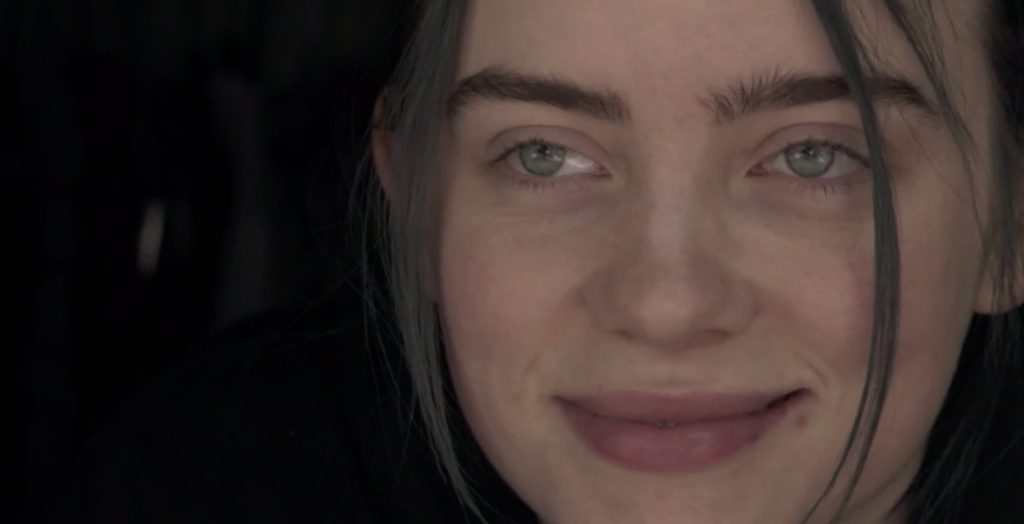
At13 years old, Billie Eilish uploaded her song “Ocean Eyes.” And in less than 24 hours, it went viral.
Now, she’s a Grammy award-winning superstar. With millions of fans and streams, Eilish has taken the world by storm with her distinctive voice and her goth-pop vibes.
And if you’ve ever heard her music, you likely understand how she rocketed to fame. Eilish is one of a kind, with a vibe that’s all her own. She’s largely resisted the ever-present opportunity to sexualize herself and her music. And she’s open, honest and transparent with her disdain for drugs as well as her own struggles and insecurities. She’s not polished or pretty, with profanity sometimes seeping in. But that gritty authenticity has only propelled her fame further.
This documentary offers fans and viewers a look into Billie Eilish’s story and much more. This movie peers into her personal life; the ups and downs of fame; and the anxiety and loneliness of constantly being watched. And it shows the singer’s process of making music come to life as she hits issues such as depression, relationships, dark thoughts and suicide.
The documentary depicts Billie as a kind, caring young woman who cares a lot about making sure others are OK. It’s also clear that she craves human connection and relationship above her material possessions. She loves her family and friends and values her relationships.
Billie is also extremely vulnerable and open. She’s not afraid to be honest about how she feels, and she doesn’t want to mask her emotions. She wants to create music that reflects how she feels and connects with others. And although she clearly never intended to write hits, we see how her point of view resonates with millions of people across the world—especially those dealing with their own personal and mental health issues. Billie discusses her battle with terrets syndrome as well as her insecurities, physical ailments, struggles and loneliness.
Billie also admits that she’s not great at taking care of her mental health and that she struggles with people-pleasing. However, as the story here progresses, she sets boundaries to protect her from unhealthy relationships and patterns. “It doesn’t make me happy to be lonely all the time,” she says , “so I’m working on it.” To help her in that area, she invites a friend to go on tour with her.
We see that Billie shares a very close bond with her brother and fellow musician Finneas. They have annoyances and disagreements like all siblings do, but they love one another. This is true of Billie and her parents as well. Finneas is also one of the only people who understands Billie at a deep level, which enables him to communicate with her in ways she will receive.
In one scene, a producer suggests Billie not write songs that talk about disliking drugs, in case she ever succumbs to a different lifestyle. Her mother vehemently disagrees with that opinion and tells her daughter not to listen. Billie’s mom also supports, encourages and loves her well. Billie’s family encourages her to choose friends who value her and add value to her life in a positive way.
A few of Billie’s drawings that she shares with the camera are pretty ominous and grim, with some looking like ghouls while others represent the obviously dark thoughts and ideas she wrestles with.
Some of that tendency toward dark introspection is reflected in her music, too. Billie’s Grammy award-winning album, WHEN WE FALL ASLEEP, WHERE DO WE GO? largely focuses on her own nightmares and talks about themes such as monsters, immorality, going to hell and other unsettling themes.
People wonder why Billie isn’t writing “happy” music, to which she responds that she often doesn’t feel happy. “I feel the dark stuff, so why wouldn’t I write about that?” she says.
In one scene, Billie watches a YouTuber talk about how she believes her album is “completely satanic,” a statement Billie finds comical.
Billie’s father mentions having faith to live, but never goes into the specifics of his beliefs. Billie thanks “the Lord” for a necessary break up.
Many of Billie’s song deal with the ups and downs of romantic relationships, including one in which she calls a guy her “strange addiction.” Another song flirts with sadomasochism while another jokingly wishes that a man is gay instead of disinterested in her.
Billie gushes over loving Justin Bieber when she was in middle school. A boyfriend tells Billie she’s “so fine” and she says the same to him.
Finneas goes shirtless while Facetiming. A drawing of a cartoon female hangs on Billie’s wall, her nipples covered by a strip of cloth. Billie shows the camera a few drawings in her personal notebook, including male and female genitalia. Someone makes a joke about the male and female anatomy.
Some of Billie’s lyrics wade into violent territory. Topics such as cannibalism, murder, self-mutilation and suicide are all present. One song says: “Step on the glass, staple your tongue.”
Billie even admits, in a very vulnerable moment, that she used to hide razors in her room and cut herself because she thought she deserved it.
Billie is obsessed with Justin Bieber and jokingly says that “he could ask me to kill my dog, and I would.” We hear that Billie’s boyfriend is at the emergency room because he punched a wall and broke his hand.
God’s name is misused once and paired with “d–n.” Jesus’ name is misused once also. The f-word is used more than 20 times, and the s-word more than five times. Other profanity includes a few utterances each of “d–mit,” “b–ch” and “a–.” The n-word is heard in a song.
Billie clearly expresses her strong belief that “drugs and cigarettes are literally you killing yourself,” something she reiterates in one of her songs called “xanny.” While on the phone with a boyfriend, Billie gets upset when he says he drove home while “hung over.”
It seems that a lot of Billie’s own emotional turmoil is rooted in negative thinking about herself. She says a few times that she doesn’t understand why people want to listen to her music or why they even like her as a person. Journal entries express inner turmoil in phrases like “I am going to drink acid,” and, “I will always be broken.” She’s also terrified of being hated, something that we can all relate to.
A few scenes show both Billie and Finneas being impatient and rude with directors and family members. Billie complains that she never gets a second to just be a normal, frustrated teenager without someone leaving a negative comment online.
Billie has a boyfriend who doesn’t treat her well and doesn’t make time for her. Later, Billie’s parents admit that they have no idea where her boyfriend lives, or where other boyfriends have lived.
As I was watching this documentary, I observed many things. But perhaps the thing I noticed most was that Billie Eilish seems to have a gift of translating her vulnerability into relatable words. And she seems to be someone who is desperate for connection. Desperate for a deep joy.
I think that’s why her music connects with so many. That’s why millions of people from all over the world flock to her to thank her for expressing the same things they’ve been feeling, and for not being ashamed to do so.
To put it plainly, we all feel deep, confusing emotions. We all have struggled with dark thoughts, bouts of sadness or depression. This is a normal, human experience.
Clearly Billie is a role model and someone many tweens and teens idolize—whether she’s always comfortable with that or not. In some ways, Eilish’s honesty may pave the way for young fans to tell the truth about their own painful experiences and emotions.
That said, there’s a fair bit of caution that needs to be exercised with this documentary—and Eilish’s music in general—as well. Parents should know that profanity, especially from Billie, isn’t censored.
Finally, fans have a front-row seat as Billie Eilish wrestles with her own struggles with depression and dark thoughts. Those themes are inescapable in the life and music of an extraordinarily influential young woman who is clearly searching for something more.


Kristin Smith joined the Plugged In team in 2017. Formerly a Spanish and English teacher, Kristin loves reading literature and eating authentic Mexican tacos. She and her husband, Eddy, love raising their children Judah and Selah. Kristin also has a deep affection for coffee, music, her dog (Cali) and cat (Aslan).